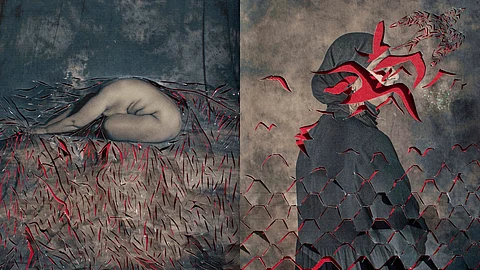
- HOMEGROWN WORLD
- #HGCREATORS
- #HGEXPLORE
- #HGVOICES
- #HGSHOP
- CAREERS
- ABOUT US
- CONTACT US

Chennai’s buzzing art scene has always been about big names, bold ideas, and intricate narratives. This year, the third edition of the Madras Art Weekend will unfold from December 12 to 15, centered around the theme of cultural conservation. The focus is on Jamakaalam— a textile art form from Tamil Nadu that is as much a part of our heritage as jasmine-scented breezes and filter coffee mornings. While some elements of our culture —like traditional crafts, music, and cuisines — deserve to be celebrated and preserved, there are others that urgently need to be left behind; like domestic abuse. An unspoken part of many households, domestic violence has, sadly, woven itself into the fabric of Indian society so much so that it is often excused as something that "just happens".
In a series of portraits, Sujata Setia's project, 'A Thousand Cuts', aims to unflinchingly bring the hidden scars of domestic abuse to light, forcing us to question the patterns of violence that have no place in the heritage we choose to carry forward. Derived from the ancient Asian form of torture, 'death by a thousand cuts' or 'Lingchi', the photography project dives headfirst into the cyclical, suffocating nature of domestic abuse in South Asian communities. It will be exhibited at Madras Art Weekend from December 12 to 14.
The portraits seem delicate, printed on whisper-thin A4 sheets that flutter under the weight of their narratives. This fragility mirrors the tenuous existence of the survivors themselves, their lives eroded bit by bit by years of abuse. Sujata uses actual cuts — precise, deliberate incisions — on the portraits, visually mimicking the emotional and psychological toll that's inflicted over time. The cuts are symbolic, guided by the survivors’ stories, undertaken in collaboration with them, just like the portraits themselves. It’s their way of taking back control and deciding how their pain should be seen and understood. The final images, tightly cropped, exude a sense of suffocation, capturing the claustrophobia of lives lived within the confines of abusive relationships.
Underneath the portraits of women is a bold red background peeking through; layered with meaning. The red emerges as holes in the lives of these women, like something has been taken away from them. Unlike the usual patronizing narratives around abuse like "it doesn't define you", these portraits highlight how the traumatizing history of these women are very much a part of them. And they still survive. The pain, the fight, and the resilience; they carry all of it with them.
The materials used by the artist are everyday items found in homes. They act as a chilling metaphor for violence hidden within the most sacred of spaces. The domestic realm, often idealized as a haven, becomes a battlefield where love and belonging are twisted into coercive control. In one haunting conversation, a participant described how generations of societal conditioning shaped her understanding of love and care as synonymous with control and pain. These deeply ingrained beliefs, seen as prevalent in South Asian cultures perpetuate cycles of abuse, normalising verbal and psychological violence in a way that makes it almost invisible —until it isn’t.
Sujata’s project began in a church in Hounslow, UK, where survivors came together to share their stories without fear of judgment. This metaphorical waiting room evolved into a sanctuary for candid conversations about trauma, identity, and resilience. Through ongoing dialogues, Setia built a vector of trust, allowing survivors to reclaim their narratives. The act of selecting their own portraits and deciding on the cuts transforms them from subjects of their trauma to women reclaiming their stories. This autonomy in itself is a liberating way to confront something that had the women imprisoned for a long time. 'A Thousand Cuts' is the proverbial airing out of the wound that festers because it's hidden. Out in the open, maybe now it can finally heal.
